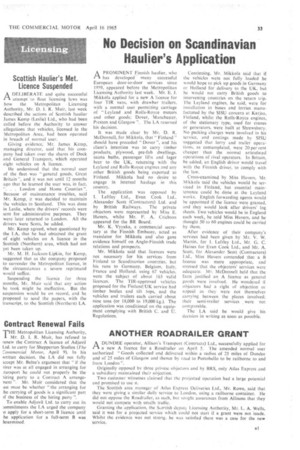No Decision on Scandinavian Haulier's Application
Page 35

If you've noticed an error in this article please click here to report it so we can fix it.
PA.A PROMINENT Finnish haulier, who has developed many successful European door-to-door services since 1959, appeared before the Metropolitan Licensing Authority last week. Mr. E. J. Mikkola applied for a new A licence for four T1R vans, with drawbar trailers, with a normal user permitting carriage of "Leyland and Rolls-Royce motors and other goods; Dover, Manchester, Preston and Glasgow ". The LA reserved his decision.
It was made clear by Mr. D. R. McDonnell, for Mikkola, that " Finland " should have preceded "Dover ", and his client's intention was to carry timber products, plywood, pre-fab dwellings, sauna baths, passenger lifts and lager beer to the UK, returning with the Leyland and Rolls-Royce engines and any other British goods being exported to Finland. Mikkola had no desire to engage in internal haulage in this country.
The application was opposed by I. Leftley Ltd., Evan Cook Ltd., Alexander Scott (Contractors) Ltd. and by British Railways. The private objectors were represented by Miss E. Havers, whilst Mr. F. A. Crichton appeared for the BR Board.
Mr. K. Vyyaka, a commercial secretary at the Finnish Embassy, acted as translator for Mikkola and also gave evidence himself on Anglo-Finnish trade relations and prospects.
• Mr. Mikkola said that licences were not necessary for his services from Finland to Scandinavian countries, but his runs to Germany, Belgium, Italy. France and Holland. using 67 vehicles. were the subject of about 163 valid licences. The T1R-approved vehicles proposed for the Finland/UK service had timber bodies and tilt tops, and the vehicles and trailers each carried about nine tons (or 18,000 to 19,000 kg.). The application was conditional on the equipment complying with British C. and U. Regulations. Continuing, Mr. Mikkola said that if the vehicles were not fully loaded he would hope to pick up goods in Germany or Holland for delivery to the UK, but he would not carry British goods to intervening countries on the return trip. Ihe Leyland engines, he said, were for installation in buses and lorries manufactured by the S1SU concern at Karjaa, Finland, whilst the Rolls-Royce engines, of the stationary type, used for cranes or generators, were built at Shrewsbury. No packing charges were involved in his service, and costings made by SISU suggested that lorry and trailer operations, as contemplated, were 20 per cent cheaper than the normal articulated operations of rival operators. In Britain, he added, an English driver would travel with the Finnish driver, to comply with the law.
Cross-examined by Miss Havers, Mr, Mikkola said the vehicles would be serviced in Finland, but essential maintenance could be done at the Leyland works. English forwarding agents would he appointed if the licence were granted, and they would look after drivers' log sheets. Two vehicles would be in England each week, he told Miss Havers, and he thought 50 to 60 engines could be carried by them.
After evidence of their company's services had been given by Mr. V. W. Martin, for I. Leftley Ltd., Mr. G. C. Haines for Evan Cook Ltd., and Mr. A. Scott, for Alexander Scott (Contractors) Ltd., Miss Havers contended that a B licence was more appropriate, and stressed that the objectors' services were adequate. Mr. McDonnell held that the facts justified an A licence as general goods were involved. He wondered if objectors had a right of objection or appeal as they were not themselves carrying between the places involved; their semi-trailer services were not comparable.
The LA said he would give his decision in writing as soon as possible.




















































































































